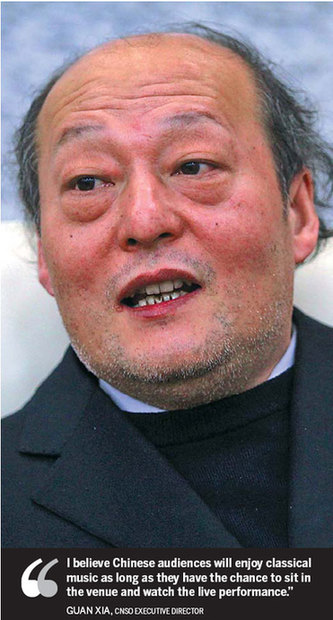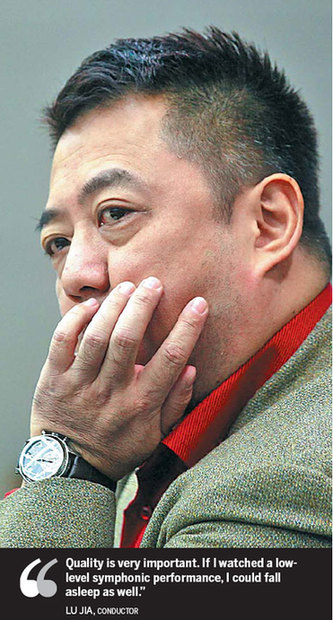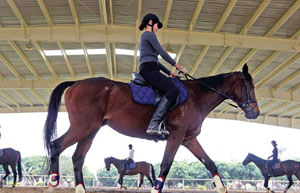Strings attached
Updated: 2011-12-21 09:36
By Chen Nan (China Daily)
|
|||||||||
The China National Symphony Orchestra's leadership ponders how its New Year concert fits into the country's changing views of classical music. Chen Nan reports.
China National Symphony Orchestra (CNSO) executive director Guan Xia has spent the past eight years showing classical music's charm to Chinese audiences through master classes, open rehearsals and free concerts. He's now busy with CNSO's second Sound of China New Year Concert, which will ring in 2012 as the city's first major classical music event of the year. "My history with the CNSO goes back a long way," the 55-year-old, who has led the orchestra since 2004, says.
"Although classical music caters to a minority taste, the longer I stay in the position, the more I feel the need to introduce the music genre to the Chinese public."

Opening on Dec 30, 2011, at the Great Hall of the People, The Sound of China New Year Concert will continue the first year's format. CNSO will play Western classics, including Beethoven's German Dances, Mozart's Overture to the Marriage of Figaro and Johann Strauss' Voice of Spring Waltz.
"All those masterpieces are time-honored and Chinese audiences are familiar with the melodies, which is a good way to introduce the music genre to the audiences," Guan says.
"Once the audiences become interested in the musical genre, they will explore it themselves after the concert. Our concert serves as a window to classical music. I believe Chinese audiences will enjoy classical music as long as they have the chance to sit in the venue and watch the live performance."
Works from Chinese composers are also an indispensable part of the concert.
Composer Li Huanzhi's Spring Festival Overture, Lu Qiming's Ode to the Red Flag and Dance of Yao Ethnic Group, composed by Liu Tieshan and Mao Ruan, will be performed.
Guan says new works will be staged, too.
He also points out Chinese audiences are familiar with the New Year Concert concept from the Vienna Philharmonic's annual New Year's Concert. The Sound of China New Year Concert has been tailored for Chinese audiences.
"We want it to become a brand, as the New Year Concert belongs to Chinese people in particular," he says.
CNSO staged nearly 200 performances worldwide in 2011, Guan says.
"The China National Symphony Orchestra was a solid, energetic and meticulously drilled ensemble," he says. "And the excellent performances by the orchestra won over audiences."
The New York Times reports CNSO was "given prolonged applause".
Guan is also a composer, whose major creations include Fantasies Symphonious: Farewell My Concubine (2005), the Chinese opera Sorrowful Morning and Mulan Psalm.
He says it has been interesting to witness Chinese attitudes toward classical music change.
"In 2004, CNSO performed in Henan province for the first time," he recalls.
"The audiences didn't know the music, and they bought the tickets perhaps out of curiosity. When the orchestra played onstage, the audiences chatted offstage, cracking melon seeds and even laughing loudly. I couldn't help but ask the theater manager to keep order."
But CNSO returned to Henan every year, and audiences got to know classical music, which completely changed the situation.
"Our performances at the National Center for the Performing Arts (NCPA) were all sold out in 2011, which was a big commercial success for CNSO," Guan says.
"It proves Chinese audiences need classical music. The market has big potential."
During the past few years, CNSO has also absorbed many talented young instrumentalists, who've studied classical music abroad.
"The young members have different understandings about sound and music," he says. "I believe that with (them), CNSO will progress faster and bring more to audiences."
The first Sound of China New Year Concert came to be after Li Yu - the wife of CNSO's first conductor Li Delun - handed the baton to CNSO's principal resident conductor Li Xincao in December 2010.
"Li conducted the first concert in commemoration of the 200th anniversary of the birth of Mozart, in Beijing, after the founding of CNSO," Guan says.
"It was in 1959. Now that we have the honor to have his baton, we want to continue the legacy and bring classical music to more Chinese."
Lu Jia will take the baton at the upcoming concert. The Shanghai native, who studied orchestra conducting at the Central Conservatory in Beijing, has conducted many international orchestras. They include the European Chamber Orchestra, the Chicago Symphony Orchestra and the Symphonic Orchestra of Melbourne and Sydney.
"Usually, the conductor of a symphonic concert receives the most attention from audiences," Lu says.
"The moves, the facial expressions and the tacit understanding between the conductor and the orchestra are all crucial for guaranteeing the high level of the concert. Chinese audiences are open to various means to access classical music, such as listening to CDs and attending symphony orchestra concerts. But those concerts' levels are not all good. Ours will provide a quality guarantee."
Opera has also been fundamental to Lu's career. He's the art director of the NCPA Opera House. While preparing for the New Year concert, he will conduct Giacomo Puccini's three-act opera Tosca.
Under Lu's recommendation, the concert will also stage Puccini's Intermezzo from Manon Lescaut and Pietro Mascagni's Intermezzo from Cavalleria Rusticana.
"Operas and symphony orchestras are all from the West," Lu says.
"They are a totally different culture to Chinese audiences. We've seen more Chinese buy tickets and watch operas and symphony performances in recent years.
"We've decided not to simply present yet another identical concert but rather to do something truly meaningful."
But Lu says many Chinese still believe classical music is "boring" and "hard to understand".
"I think that's because they didn't actually sit in the venue and feel the performance," he says.
"Music of any genre is very subjective. You can understand it in your own way. But quality is very important. If I watched a low-level symphonic performance, I could fall asleep as well."
The conductor will also lead CNSO to interact with audiences during the pre-concert "open day". The goal is to bring audiences closer to classical music by sharing basic knowledge about the genre and inviting the public to the rehearsal.
The concert will be broadcast by China National Radio on Dec 30.











